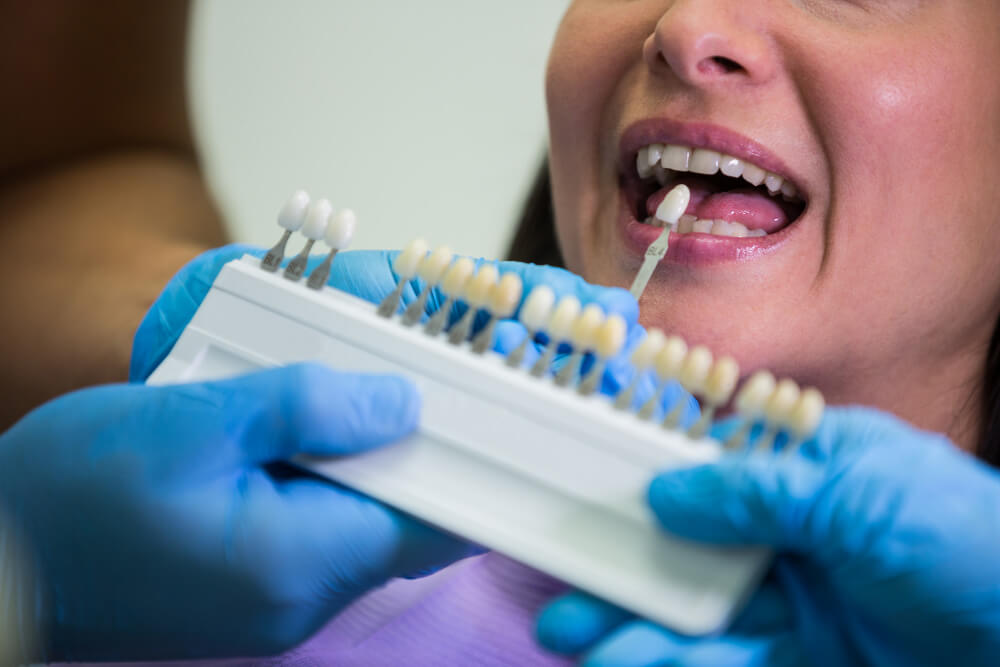Waking up to a clean, comfortable mouth is one of life’s quiet pleasures. For many Australians replacing missing teeth, that daily comfort depends on a choice between fixed implants and removable dentures. Both restore a smile, yet their day-to-day behaviour around plaque, soreness and hygiene could not be further apart.
Plaque: Where It Gathers and Why It Matters
Dental plaque is a sticky film of bacteria and food debris. On natural enamel it clings to tiny pits and fissures; on acrylic dentures it loves the microscopic pores found in the pink base material. An implant crown, in contrast, is made from glazed porcelain or polished zirconia that feels similar to natural enamel. The smooth, non-porous surface leaves far less for plaque to grip, so morning build-up is usually lighter.
Those little differences show up under a toothbrush. Denture wearers often scrub the appliance in the sink, rinse it, then soak it overnight. Even a single lapse invites a rapid bacterial bloom that can taste sour and affect breath. Brushing an implant crown while it remains rooted in the jaw feels no different from brushing the neighbouring tooth, so routine rarely slips. That seemingly small convenience has big implications for gum health over the years.
Soreness and Fit
A well-made denture should sit snugly, yet slight movement is inevitable as the acrylic base rests on soft tissue. Daily talking and chewing can rub the gum ridge, leading to pressure spots. If weight is lost or the jawbone remodels, gaps widen and sore patches multiply. Adjustments help, but each visit means more chair time.
Implants sidestep those issues. A titanium post fuses with bone in a process known as osseointegration. Once healed, the crown transfers chewing forces through the implant into the jaw just as a real tooth root would. Because nothing rides on the gum, there is no rubbing. People sometimes report minor tenderness during the early healing weeks, yet chronic irritation is rare.

Hygiene Routine: One Feels Familiar, One Doesn’t
Ask anyone with a mixed smile— cheap dental implants Sydney at the front, partial denture at the back—and they will often confess that two distinct cleaning rituals complicate evenings. The denture must come out, be brushed over a sink of water (to cushion drops), then sit in a soaking cup. At the same time, natural teeth demand floss and brush. Many simply rush the job.
Implants blend into the ordinary oral-care timetable. Standard brushing, inter-dental brushes and if needed a water flosser do the trick. Hygienists still keep an eye on the implant sites, yet instructions remain familiar, so compliance tends to be better long term. For those pricing options, ask about payment plans. Some providers break the cost of dental implants Sydney residents pay into staged instalments linked to surgery milestones. Others cooperate with health-fund gap-cover schemes that trim the dental implants price Sydney members ultimately shoulder.
Diet, Speech and Confidence
Removable plates can shift under heavier bites, prompting people to avoid crusty bread or apples. Palate coverage may also mute taste buds and alter speech. By contrast, an implant crown emerges directly through the gum without a bulky plate, restoring near-normal bite strength and clarity of speech. Sticky toffee offers no particular fear factor, and a confident laugh returns without worrying about a slipping denture.
Counting the Dollars
Many people assume implants are unaffordable, yet the picture is broader. Dental implants Sydney clinics publish guide prices online, but the final figure depends on bone density, number of teeth and the materials chosen. For reference, the dental implants cost Sydney patients face for a single straightforward site typically starts from $2,850, including surgery, abutment and crown.
Compare that with a full acrylic denture billed at a fraction of the outlay. The immediate appeal is obvious; still, dentures usually need relining every few years and full replacement roughly every seven. Over two decades, repeated laboratory fees and extra appointments add up. When discomfort or embarrassment pushes someone toward an implant later on, the earlier denture spending can feel like money lost.

Long-Term Value
When judging tooth implants Sydney cost overall worth, comfort and convenience matter as much as upfront cash. Regular denture relines, adhesives, special cleaning tablets and the occasional lost plate all nibble at the budget. Meanwhile, an implant that is brushed twice daily and checked by a dentist twice a year could last decades. Framed in those terms, many see an Affordable dental implants Sydney package as an investment in everyday quality of life rather than a luxury purchase.
Final Thoughts
Plaque sticks less, gums stay calmer and nightly cleaning feels familiar when missing teeth are replaced with implants rather than dentures. No solution suits absolutely everyone; medical history, bone volume and finances all influence the decision. Yet for many Australians who want a low-maintenance, confidence-boosting result, implants prove the option that slips seamlessly into normal oral care—and stays there.
Frequently Asked Questions
1. Are dental implants uncomfortable to live with day-to-day?
Once healing is complete, a correctly placed implant feels like a natural tooth. It stays fixed, produces no rubbing, and rarely causes irritation. Occasional soft-tissue checks with your dentist help ensure surrounding gums remain healthy, but daily comfort is usually excellent overall.
2. How long does the implant procedure take from start to finish?
For most single teeth, expect six months. Planning and post placement come first, then bone integration for three-to-four months, followed by crown attachment. During healing, a temporary tooth maintains appearance, so daily activities continue unhindered while the implant settles.
3. Will my speech be affected after receiving implants?
A single implant crown sits flush with gum tissue, so pronunciation remains unchanged. For multiple units replacing an entire arch, the bridge lacks bulky palate coverage, letting the tongue move naturally. Most people notice clearer diction compared with conventional dentures within days.
4. How do I clean around an implant compared with a natural tooth?
Use a soft brush twice daily; angle bristles at the gumline to sweep plaque. Inter-dental brushes or floss threaders reach under the crown-abutment junction. Water flossers add certainty. Maintain six-monthly dentist reviews to track bone and tissue health.
5. Who is not a suitable candidate for dental implants?
Adequate bone volume and good oral hygiene are essential. Uncontrolled diabetes, heavy smoking, recent head and neck radiotherapy, or active gum disease can undermine healing. Your dentist will review medical history, lifestyle, and three-dimensional scans before advising alternative solutions if required.


